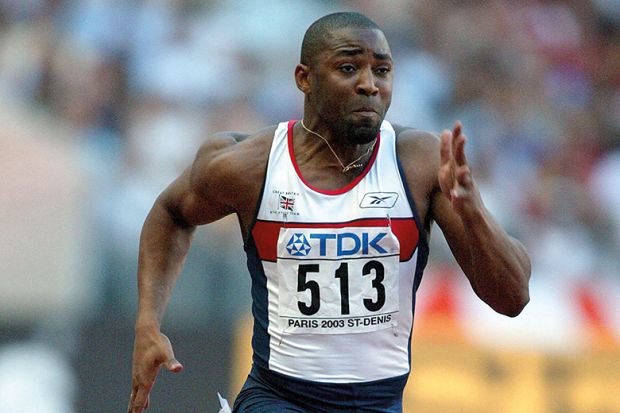His best friend had recently been murdered, and he was out for revenge – an all-too-familiar story on the streets of Manchester’s Moss Side in the 1990s.
Fortunately for him, he just so happened to have a talent as an athlete, which meant that there was a network of sportspeople around him ready to sound the alarm bell.
That is how I came to receive a phone call from Clive Lloyd, the former West Indies and Lancashire cricket captain, asking if I, as someone who had come from similarly disadvantaged circumstances to win five karate world titles, could intervene.
And that was what led to my daily chats with the young man, calming his anger and showing him that there was an alternative to the spiral of violence that blights the lives of so many young people in our disadvantaged inner cities.
Without that social coaching, I have no doubt that Darren Campbell would be dead.
His name was on a bullet. Yet now, Darren’s name is inscribed on trophies and honours boards after an athletics career that took him to the top of the podium at Olympic and Commonwealth Games.
His life has now come full circle as he combines his business and broadcasting career with working with young people to improve their lives through sport.
A year after meeting Darren, the culture of disaffection, disadvantage and lives being lost that I witnessed in Moss Side led me to found the Youth Charter – a charity and UN-accredited non-governmental agency that uses sport, the arts and digital activity to tackle issues of non-attainment, inequality, ill health, antisocial behaviour, racism and crime, including drug- and gang-related activity.
The organisation celebrates its 25th anniversary this month, having delivered hundreds of projects and programmes in the UK and across the world to bring social, economic and cultural change to the lives of young people and their communities.
At the heart of its work is the “community campus” model, which finds collaborative solutions to bring together facilities such as schools, community centres, youth clubs and higher and further education institutions that can offer young people sporting and cultural activities in a safe space supervised by volunteer “social coaches” armed with rich life experiences, emotional intelligence and resilience.
I was brought up on the tough streets of Hackney, and so the Youth Charter’s latest project to apply the community campus principles to East London is particularly close to my heart.
Six years after playing host to an Olympic Games that was meant to “inspire a generation”, many young people in the immediate vicinity of the Queen Elizabeth Olympic Park remain excluded socially and economically from the regeneration taking place around them, while physical activity has flatlined in the area since 2012.
The escalation of gun and knife crime in the borough of Newham recently prompted young people in the area to take the matter into their own hands by organising a youth conference to discuss the problems of crime and safety.
As chair of governors of the University of East London, I was pleased to host the conference on our campus and have pledged to support the youth organisers and to commit university resources to provide a hub for the developing community campus to tackle issues of disaffection, exclusion and crime.
It was not a one-off for UEL. Civic engagement is at the heart of almost everything that happens at the university. In 2016, our students participated in 33 separate projects to improve lives in their local community, initiating projects ranging from lung cancer awareness to promoting financial literacy.
These issues are not unique to the UK, as I shall outline in a series of roadshow presentations across the country. Working in partnership with universities, we can bring transformational change to young people’s lives in communities across the world and deliver tangible social, cultural and economic outputs. What can be achieved locally can also be achieved globally.
These events will bring together Commonwealth Youth, introduce them to their wider Commonwealth family. It will encourage them to become involved with the diverse and powerful network of young people and organisations within the 53 member states, helping them to create a common future that is fairer, more secure, sustainable and prosperous.
The sentiments are unarguable but, equally, I urge Commonwealth leaders to turn these into decisive actions, developing multi-agency strategic partnerships coupled with on-the-ground interventions to engage, equip and empower our young people.
Doing nothing is not an option. Just ask Darren Campbell.
Geoff Thompson, the chair of governors at the University of East London, is a five-times world karate champion and the founder and executive chair of the UK-based charity and UN non-governmental organisation Youth Charter.
Register to continue
Why register?
- Registration is free and only takes a moment
- Once registered, you can read 3 articles a month
- Sign up for our newsletter
Subscribe
Or subscribe for unlimited access to:
- Unlimited access to news, views, insights & reviews
- Digital editions
- Digital access to THE’s university and college rankings analysis
Already registered or a current subscriber? Login






